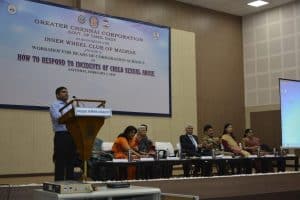‘Ambition’ sounds a rather lofty and serious word for 16-year-old S Harika*, a student of Class XI of the Corporation School, New Washermanpet. Hailing from a low-income family, Harika saw no point in nurturing ambitions, for she was almost sure that they would not be fulfilled. Today, however, she aims to become a doctor and is working hard to achieve the goal.
The change in Harika and many others like her can be attributed to a pilot project by an organisation called EngenderedCo, which is trying to improve labour force participation rates among women in India. The organisation works with two Corporation schools of North Chennai, trying to develop a mindset focused on career-building among girl students here and educating them about various aspects of empowerment.
“The number of educated women entering the workforce and sticking to their career is decreasing in India. Through this pilot project, we want to extend the Beti Bachao, Beti Padao to Beti Kamao,” said Prajakta Kuwalekar, founder and CEO of EngenderedCo.
The fact is that while we continue to talk of women empowerment and safety in cities, even a metro like Chennai has a long way to go before it can ensure that its young girls are effectively trained in life skills, self reliant and equipped to fight social taboos. In Corporation schools, for example, the focus is only on academics and one rarely hears talk of career guidance, emotional training or life skills.
“We teamed up with various organisations to conduct sessions on disease prevention and control. But, except in a few rare cases, sessions focussing on the girl child are not usually conducted in Corporation schools,” admitted Dr T G Srinivasan, Health Education Officer, Chennai Corporation. Thankfully, organisations such as Engendered Co are now stepping in to fill that gap.
The Inner Wheel of Club of Madras, for example, conducts sessions in Corporation Schools with a view to sensitising all stakeholders — children, parents and teachers — about sexual violence so that child sexual abuse can be fought head on. “About 285 Heads across Corporation Schools have participated in an interactive workshop conducted to sensitise their teachers. Police, lawyers and child helpline persons addressed various queries on abuse and routes to redress,” said Subha Srikanth, President of Inner Wheel Club of Madras.
The changes that such sessions bring about in the girls are significant and multifarious. For example, Saritha K* who studies in the Korrukupet Corporation School where EngenderedCo runs its programme, is using a menstrual cup, probably the first to do so in her school. Another girl mustered the courage to speak to her father about her interest in playing kho kho.
In one of the sessions, girls and teachers opened up about the stigma faced during menstruation: restricted entry into the house, restriction to touch anyone or anything and living with a feeling that they are ‘impure.’ Those taboos were busted and many girls actually spoke to their parents. One of them objected when asked to sleep alone in a dingy room when she was on her period and spoke to her mother about her right to dignity.
“My daughter made me speak to a social worker who explained about the irrational stigma attached to menstruation and the advantages of a menstrual cup. I cannot give up on all those practices, but I have started using a cup,” said Srikala, mother of a student. Thus, the chain of positive events goes on. “We will have sessions with other parents too, to change the way they look at menstruation,” said a teacher.
In some sessions, women with successful careers in various fields talked to the girls. A loco pilot from Chennai suburban rail, an international sailor, a pilot, an environmentalist and a social entrepreneur talked about the challenges they faced in achieving their goals and how they overcame these. Their insights will now help EngenderedCo design a full-time training programme in Corporation schools of North Chennai.

Greater Chennai Corporation Commissioner, G Prakash, addressing the audience at a workshop conducted on Child Sexual Abuse. Pic credit: Subha Srikanth
The Inner Wheel sessions exposed the lack of knowledge among stakeholders: many students are not even aware of the name of the body parts. Parents and teachers rarely communicate with children about the different types of touch or what types of behaviour they should guard against. “It’s difficult for a child to speak up. Parents and teachers have the responsibility to observe and help a child in distress,” said a teacher.
Through storytelling, role play and games, the club members teach children about good touch and bad touch and the ways to seek help if they face any form of abuse.
Experts across the board agree that it is important to engender ideas of safety and empowerment among girls from a tender age. Chennai Corporation should therefore find a way to expand the ongoing projects.
(*Names of the students were changed upon request from the schools)